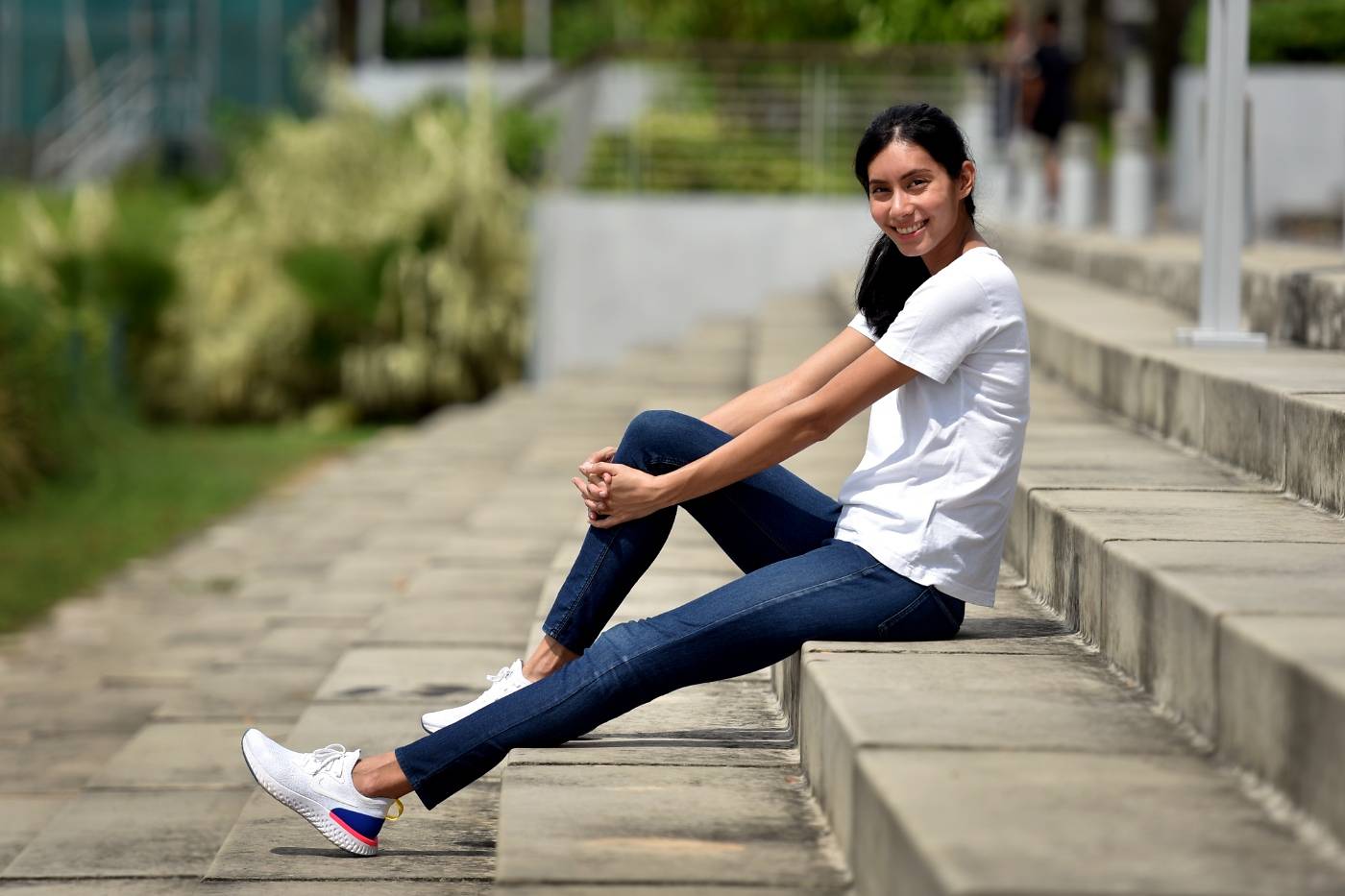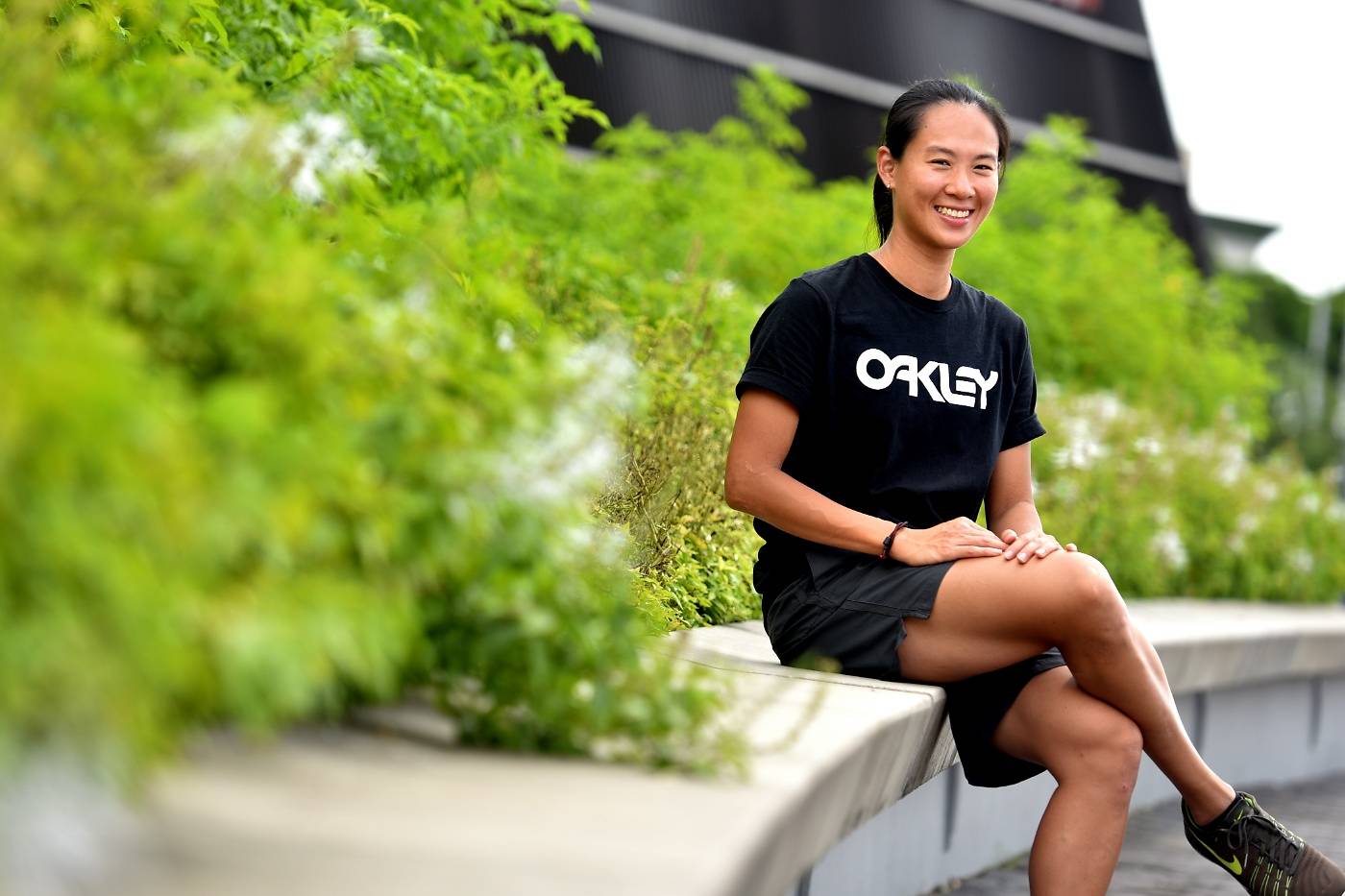SINGAPORE: None of the students at Catholic Junior College knew one of their PE teachers was a Southeast Asian cycling champion. That was until Dinah Chan’s colleagues gleefully tipped them off, and a quick Google search later it went from “Ms Chan, give chance please?” to “Ms Chan, can you sign my bicycle for me?”.
“I’d really rather not. I’m a normal person, a normal person,” the 32-year-old laughed as she recounted what she told her newly starstruck students. That “normal” status is something she has savoured since retiring in February this year, after nearly a decade representing Singapore – of which half was spent as the local face of cycling.
“I do miss the time spent hanging out with my national teammates – they were like family,” said Chan, who made headlines when she struck SEA Games gold in 2013 – three months after being hit by a car. “But for me it was really easy to transition out. I had so many things I wanted to do after retiring.
“And now, I don’t have to feel guilty for not training, for being tired, for staying out late, for eating nonsense.”
Chan competing in Copenhagen in 2011 (Photo: AFP/Jonathan Nackstrand)
Former track-and-field standout Dipna Lim Prasad, 27, has also experienced a smooth adjustment since ending a 13-year stint as a national athlete in September.
The Singapore record-holder for both 400m and 400m hurdles is mulling over potential job offers, while keeping in mind her priority to start a family with her husband, former national sprinter Poh Seng Song.
But stepping down from high-level sport can be difficult too, according to ex-national rower Saiyidah Aisyah, who was a 2013 SEA Games champion and 2016 Olympian.
“I know of a few athletes who went or are going through this low point in their lives and find it so hard to talk about it,” said the 30-year-old, who spent 13 years competing for Singapore. “I think I was a little mentally and emotionally distressed.”
She insisted on not being labelled as retired, citing “unfinished business” – has not raced for Singapore in over two years and is no longer carded by governing body Sport Singapore, which removes her eligibility for funding and other assistance.
“When you retire from sport, you’re probably poorer than your peers,” said Aisyah. “It feels like you start from square one in terms of career and life. That’s why athlete retirement is hard, but many people don’t realise that and it is sadly hardly spoken about.
“It’s not really a thing yet in Singapore, but with more and more athletes training full-time, post-retirement support is so important.”
Lim Prasad in action at the 2017 SEA Games (Photo: SNOC)
SEA CHANGE IN ORDER
Purely in terms of securing a job, national athletes can bank on a Sports Excellence Business (spexBusiness) Network, which matches them with almost 60 prospective employers. Hundreds of sportspeople have benefitted from the programme so far.
Aisyah, Chan and Lim Prasad also acknowledged active athletes “definitely have less to worry about” – thanks to initiatives such as campaign funding schemes and the Sports Excellence (spex) Scholarship, which provides financial and developmental aid for an elite crop of national athletes.
“Things have improved since we started, and we got a lot more support than before,” said Chan. “But there’s still a long way to go; a lot more to grow.”
Said Lim Prasad, who is vice-chair of the Singapore National Olympic Council’s (SNOC) athletes’ commission: “It takes a long time to bring about a full shift in mindset from ‘admin-centric’ to ‘athlete-centric’, but those sports that have done so have grown exponentially.”
Both admitted that the exact method for engineering such transformation remains “a big question mark”.
“We can debate for days and we wouldn’t come up with an answer,” Lim Prasad quipped. “We’ve been doing it at every level – from the athletes’ commission to focus groups and up to ministries – asking what will be a catalyst for change in Singapore sports.
“But there’s really no one thing. Everything works together, and you don’t really know which string to pull first to accelerate change for everything else.”
“So it’s really a lot about collaboration between people who can work together and know what they’re doing,” she added. “And to keep trying, even if it takes years to figure out.”

Dwindling motivation, run-ins with officials, financial concerns and wanting to start a family were among the reasons Lim Prasad mentioned in retiring (Photo: Jeremy Long)
Aisyah, who started a crowdfunding campaign en route to Rio 2016 and was selected as a spexScholar a month later, agreed. “People are very quick in pointing fingers and blaming the Government, but the only way we can build a successful sporting nation is when people come together to raise an athlete.
“Like how people helped me in my Olympic journey … It would not have been possible without the support from Singaporeans and two years on, I am still very grateful.”
Big-picture issues aside, the next best thing national athletes can do is keep their heads down and focus on the work, said Lim Prasad, while pointing to how her genuine love for running saw her through a rough start – where she couldn’t even make the school team – and down the road, the “politics and drama” of dealing with sports officials.
Chan, meanwhile, said it would also help to recognise that sport was not everything. “It’s just a part of your life, there’s more to life,” she said. “You’re not in a bubble, you’re in the world.”
Aisyah’s advice to athletes: “Continue to believe in yourself no matter what how hard the going gets, because there may be a point where belief is the only thing you have left.” (Photo courtesy of Saiyidah Aisyah)
RISE ABOVE
Nonetheless, it was barely minutes into the interview when the former cyclist admitted, unprompted, that her legs were “starting to get itchy already” and she would definitely like to race again.
That will not happen soon as Chan is still recovering – though almost completely healed now – from the chronic fatigue syndrome which plagued her for nearly three years.
Aisyah, too, declared she was “not done with being an athlete” – even if currently tied up in plans to wed her fiancé, write a book and pursue personal training certification.
While Lim Prasad did not close the door on a future return, she said it would be impossible to predict how her priorities or physical condition would change after having children.
But she was crystal clear that any career revival would not be motivated by the pursuit of SEA Games gold that has thus far eluded the three-time silver medallist.
“It was never about the medal,” said Lim Prasad. “I know the colour matters in terms of funding etc., but I’ve always pegged my success to my improvements.
“I genuinely wasn’t good enough for gold, and that’s that. But I’m very happy with my timings and that’s all I really can ask for.”
“If I ever come back, it would be for a new goal, a new event – the 800m,” she continued.

Feeling guilty from being away from family for too long, Chan had already wanted to call it quits in 2017 (Photo: Jeremy Long)
For now, Lim Prasad’s focus falls squarely on giving back, whether at the grassroots stage by redistributing sports footwear to needy kids through her social movement In My Shoes, or at the level of national athletes by invoking change in the ecosystem through her SNOC role.
“It’s about how I can continue to contribute community,” she said, expressing a common thread with the others.
Chan, a self-professed “innate” teacher, wants to someday explore the field of neurophysics to help people with spinal cord injuries move their limbs again.
And Aisyah is working on starting a group to support retiring athletes – not only in terms of finding employment, but in psychological aspects which she has already signed up to get a master’s degree in.
Chan, Lim Prasad and Aisyah may have made their names on a bike, boat or in sprinting spikes. But by extending their sporting drive and commitment into efforts to rally and raise society at large, they are proving themselves more than athletes – and perhaps, more than just “normal” human beings.




